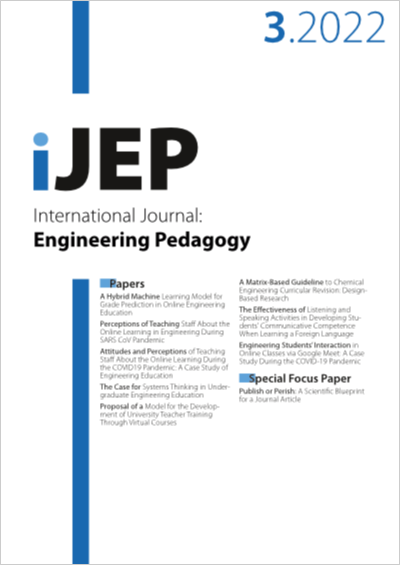A Hybrid Machine Learning Model for Grade Prediction in Online Engineering Education
DOI:
https://doi.org/10.3991/ijep.v12i3.23873Keywords:
machine learning, artificial neural network, AI, grade predictive modelling, CAD, COVID-19, online learning, hybrid modelAbstract
Facing the disruption caused by COVID-19 pandemic, the emergence of imposed and exclusive online learning revealed challenges for researchers worldwide, as of reforming curricula shortly and of collecting data accumulated by monitoring stu-dents’ commitment and academic performance. With this pool of data, this research explores grade prediction in a first-semester mechanical engineering CAD module, after testing the performance of the reform of specific curricula. A hybrid model has been created, based on 35 variables having been filtered out of statistical analysis and shown to be strongly correlated to students’ academic performance in the specif-ic online module during the first semester of the academic year 2020-2021. The hy-brid model consists of a Generalized Linear Model. It’s fitting errors are used as an extra predictor to an artificial neural network. The architecture of the neural network can be described by the following sizes: size of the input layer (36), size of the hidden layer (1) and size of the output layer (1). Since new factors are revealed to affect students’ academic achievements, the model has been trained in the 70% of the participants to predict the grade of the remaining 30%. The model has therefore been divided into three subsets, with a training set of 70% of the sample and one hidden layer predicting the test set (15%) and the validation set (15%). The final form of the trained hybrid model resulted in a coefficient of determination equal to 1 (R = 1). This means that the data fitting process resulted in a 100% success rate, in terms of associating the independent variables with the dependent variable (grade).
Downloads
Published
2022-05-31
How to Cite
Kanetaki, Z., Stergiou, C., Bekas, G., Troussas, C., & Sgouropoulou, C. (2022). A Hybrid Machine Learning Model for Grade Prediction in Online Engineering Education. International Journal of Engineering Pedagogy (iJEP), 12(3), pp. 4–24. https://doi.org/10.3991/ijep.v12i3.23873
Issue
Section
Papers
License
Copyright (c) 2022 ZOE KANETAKI, CONSTANTINOS STERGIOU, GEORGIOS BEKAS, CHRISTOS TROUSSAS, CLEO SGOUROPOULOU

This work is licensed under a Creative Commons Attribution 4.0 International License.


